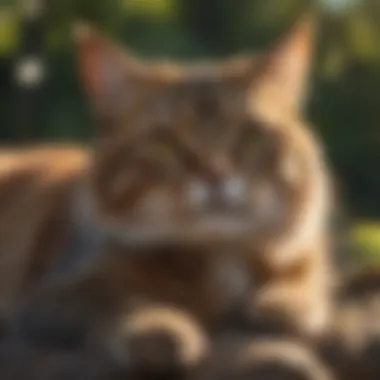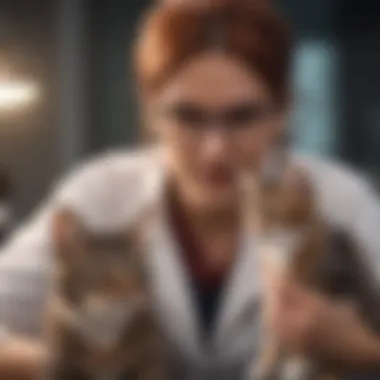Exploring Alternatives to Revolution for Cats


Intro
In the realm of feline health care, cat owners often confront the need to choose the best preventative measures for their pets. While products like Revolution for Cats offer solutions, there is a growing interest in alternative options. This guide provides a detailed overview of various methods for ensuring the wellbeing of cats without solely relying on conventional pharmaceuticals. Emphasizing natural remedies, over-the-counter options, prescription medications, and preventive care strategies, we seek to equip cat owners with informative insights to make decisions based on the latest research.
Animal Overview
Common Names
Cats are often referred to as domestic cats. They are part of the Felis catus species and are widely recognized for their companionship and diverse breeds.
Scientific Classification
The scientific classification of cats is as follows:
- Kingdom: Animalia
- Phylum: Chordata
- Class: Mammalia
- Order: Carnivora
- Family: Felidae
- Genus: Felis
- Species: F. catus
Geographic Range
Domestic cats can be found around the globe, inhabiting diverse environments. They thrive in urban areas, rural settings, and even remote regions. Their adaptability has allowed them to live in various climates, from temperate zones to tropical regions.
Health Considerations
Common Health Issues
Cats might face a range of health problems, including:
- Fleas and ticks
- Worm infestations
- Skin allergies
- Ear infections
- Dental disease
Importance of Preventative Care
Preventative care is essential for maintaining the health of cats. Regular veterinary check-ups and vaccinations can help catch potential issues early. Additionally, using alternatives to traditional methods can be beneficial, especially for cats with allergies or sensitivities.
Alternative Treatments
When considering alternatives to Revolution for Cats, it's vital to research options based on severity, safety, and efficacy. Some alternatives might include:
- Natural remedies: Herbal supplements and dietary changes
- Homeopathic solutions: Non-toxic treatments aimed at symptom relief
- Commercial products: Over-the-counter solutions specifically designed for flea and tick prevention
Exploring alternatives allows pet owners to tailor their approaches based on their cats' specific needs.
Culmination
The choice of health products for cats is increasingly complex, with a myriad of options available. Understanding each alternative's effectiveness and safety is crucial. By researching and utilizing this compendium, cat owners can cultivate a more comprehensive understanding of feline health care alternatives, thus ensuring their pets receive the best possible care.
Prelims to Revolution for Cats
When considering the health and well-being of our feline companions, addressing the various options available for care becomes a crucial topic. Revolution for Cats is a widely recognized topical parasite preventitive that serves to resolve common issues related to fleas, ticks, ear mites, and certain worms. However, the reliance on any single medication can lead to questions about efficacy, safety, and alternative approaches to feline health management. It is important for cat owners to explore the full spectrum of possibilities, ensuring their pets receive optimal protection and treatment.
Defining Revolution: Usage and Application
Revolution is a brand of selamectin, used primarily to protect cats from external and some internal parasites. Applied topically, usually at the back of the neck, it absorbs into the skin and spreads throughout the cat's body. Its advantages include ease of application and its broad spectrum of activity against a variety of pests. However, it is not effective against all parasites, and some pets may experience side effects.
Key points about Revolution's usage include:
- Ease of Application: Administered once monthly, making it convenient for pet owners.
- Versatile Protection: Addresses multiple parasites simultaneously.
- Veterinary Approval: Recommended by many vets as a first-line treatment option.
Despite these benefits, some cat owners may find that their pets do not respond sufficiently to Revolution, leading to an exploration of alternative methods for parasite control.
Common Health Issues Addressed
Revolution for Cats is designed to tackle several health issues that impact felines, particularly those related to parasites. The most common health issues addressed by this medication include:
- Flea Infestations: Fleas are notorious for causing discomfort, skin irritations, and even anemia in severe cases.
- Ear Mites: These microscopic parasites can lead to painful ear infections and significant discomfort for cats.
- Ticks: Though less common in indoor cats, ticks can carry diseases that may affect feline health.
- Heartworms: In some regions, Revolution provides protection against heartworms, a serious condition that can be life-threatening.
In summary, while Revolution offers broad coverage for various feline health issues, the exploration of alternatives provides insight into other effective solutions that may suit individual needs and preferences better.
Limitations of Conventional Medications


Conventional medications play a crucial role in feline healthcare. However, understanding their limitations is essential for cat owners looking to make informed decisions about their pets' well-being. Medications like Revolution for Cats may not always be the best option, given the potential adverse effects and other considerations that accompany their use. A critical analysis reveals significant concerns that warrant attention.
Potential Side Effects
Every medication has potential side effects, and Revolution for Cats is no exception. Common side effects might include vomiting, diarrhea, or lethargy. Some cats may experience allergic reactions, leading to more severe outcomes, such as difficulty breathing or swelling. While these occurrences are not guaranteed, they highlight the need for caution when using medication.
Monitoring a cat’s reaction after administering any medication is important. If side effects develop, consulting a veterinarian promptly can aid in addressing the issue. Furthermore, it is essential to understand that some side effects can truly impact a cat's quality of life, leading to reluctance in consuming medications in the future.
Resistance Development
Over time, pests like fleas and ticks may develop resistance to certain treatments, including those in conventional medications. This anthopological phenomenon can render a product ineffective. Resistance can occur due to improper or overuse of a medication, creating an urgent situation for cat owners. This can lead to an escalating cycle of trying stronger treatments, often with side effects and further health complications.
Pet owners must stay aware of resistance and collaborate with their veterinarian to devise an effective management plan. Knowledge of the lifecycle of the pests and the mechanisms of the treatment can improve outcomes and ensure that a cat's health stays protected.
Cost Considerations
Financial aspects of conventional medications should not be overlooked. The cost of prescription medications can accumulate, especially with long-term use. Some cat owners may find it difficult to maintain consistent medication schedules due to the financial burden. Additionally, if a cat develops resistance, switching to alternative or stronger treatments may incur higher costs and could impact overall health expenditures.
Thus, exploring alternative treatments might not only be beneficial for the cat's health but also easier on the owner’s wallet. Evaluating the cost-effectiveness of various options can help in making informed choices for the well-being of feline companions.
It is important to weigh the pros and cons of each treatment option. This awareness can guide cat owners toward better choices that consider both health outcomes and financial implications.
Exploring Alternative Options
Exploring alternatives to traditional medications like Revolution is critical for the holistic health of cats. Many owners seek to avoid potential side effects or resistance issues that some conventional treatments may incur. By considering various options, cat owners can make informed decisions that are tailored to their feline friends' specific health needs. These alternatives encompass natural remedies, over-the-counter solutions, and prescription alternatives. Each category presents unique benefits and challenges, which need careful evaluation.
Natural Remedies
Natural remedies are gaining traction among cat owners who prefer less invasive and possibly safer options for treating their pets. Many such remedies come from plants and minerals, aiming to support health naturally without harsh chemicals.
Herbal Treatments
Herbal treatments represent a significant aspect of natural remedies. They usually utilize botanical extracts, offering a holistic approach to health. One of the key characteristics of herbal treatments is that they often tout fewer side effects, making them popular among those cautious about pharmaceuticals. For example, herbs like catnip and calendula can support relaxation and skin health, respectively.
However, while herbal remedies provide benefits, it is crucial to note their unique features, such as variability in potency. This variability can pose challenges, as not all products are made with the same standards. Moreover, their interactions with conventional medicines should be assessed, introducing an element of caution when considering their use.
Homeopathic Approaches
Homeopathic approaches differ significantly from herbal treatments. They are based on the principle of 'like cures like' and utilize highly diluted substances to trigger the body’s natural healing processes. This characteristic makes homeopathy an intriguing option in feline care due to its non-toxic nature. Pet owners often find this method attractive, especially for conditions like anxiety or minor skin irritations.
Nonetheless, homeopathy's unique feature lies in its reliance on individualized treatment plans. This means each cat may require different remedies, often necessitating professional guidance. One disadvantage is the inconsistent acceptance within the veterinary community regarding its efficacy, leaving some pet owners skeptical about its value.
Over-the-Counter Solutions
Over-the-counter solutions offer accessible alternatives for pet owners looking to manage common health issues without the need for prescriptions. They can be more convenient and can often be purchased without a vet visit, which can be appealing.
Flea Control Products
Flea control products are a vital part of feline health care. Many options are available at local pet stores, from topical treatments to collars. One key characteristic of these products is their rapid effectiveness against flea infestations. Treatments like Advantage or Frontline exemplify this swift action, providing relief from irritation and potential diseases fleas may carry.
Despite their benefits, it is essential for owners to understand the unique aspects of flea products. Some may contain potent chemicals not suitable for all cats, particularly those with pre-existing health conditions or pregnant cats. Individual responses may vary, and any product should be chosen based on thorough knowledge of its ingredients.
Worming Treatments
Worming treatments play an equally significant role in a cat's overall well-being. Cats can be susceptible to various worms, which may lead to serious health issues if unaddressed. Most products provide an effective and straightforward way to manage these parasites. The key characteristic of many of these treatments is that they combine several types of anthelmintics, which can eliminate multiple kinds of worms in one dose.
While worming treatments are beneficial, owners should be aware of their unique feature, which is required dosage and potential for resistance. Not administering the medication correctly may lead to treatment failure. Overuse may contribute to resistance, posing a risk for effective future treatments.
Prescription Alternatives
Prescription alternatives are often the best route when dealing with specific health issues, especially those that over-the-counter solutions cannot address adequately. Professional veterinary guidance is essential to ensure the best outcomes for cat health.
Veterinary Guidance
Veterinary guidance forms the backbone of any medical treatment plan. Veterinarians can offer personalized assessments and recommendations based on the specific health profile of each cat. One key feature of veterinary guidance is the comprehensive knowledge vets possess about feline physiology; they can help identify issues that pet owners might overlook.
The significant advantage of consulting with a vet is access to prescription medications tailored specifically to the individual needs of a cat. However, it may come with some drawbacks, such as costs associated with consultations and treatments, which can be a barrier for some pet owners.


Tailored Treatments
Tailored treatments are often developed based on individual assessments and needs. Unlike off-the-shelf solutions, these are designed specifically for a cat's distinct health concerns. This customization is a significant advantage, especially when dealing with complex health issues.
The unique aspect of tailored treatments is their potential efficacy; they can target health problems more directly. However, they may also pose challenges. Owners should be aware that tailored medications can sometimes take time to prepare and may incur higher costs than standard treatments.
Preventative Care Strategies
Preventative care is essential for maintaining feline health and well-being. It helps in the early detection of potential health issues, reducing the severity and expense of future treatments. By investing time and resources in preventative measures, cat owners can enhance the quality of life for their pets and mitigate risks associated with various health concerns. This section focuses on crucial preventative strategies that cat owners should actively pursue.
Regular Health Check-Ups
Scheduled veterinary visits play a vital role in a cat's life. Regular health check-ups allow for thorough assessments of your cat’s overall health. Through these visits, veterinarians can detect any underlying issues before they become serious. It’s advisable to schedule these visits at least once a year. However, senior cats or those with health issues may require more frequent check-ups.
During these examinations, a veterinarian may check for:
- Weight and body condition
- Dental health and potential oral diseases
- Heart and lung function
- Skin and coat condition
Early identification of concerns can make a significant difference in treatment options and outcomes, highlighting the importance of routine vet visits.
Vaccination Protocols
Vaccinations significantly contribute to a cat's health by preventing many common, serious diseases. Vaccinating is not only beneficial for your cat but also helps in controlling outbreaks within the larger feline community. The vaccine schedule varies but typically includes:
- Feline Panleukopenia
- Feline Calicivirus
- Feline Viral Rhinotracheitis
- Rabies
Consulting with a veterinarian will give tailored recommendations based on your cat's lifestyle, age, and health status. Following the recommended vaccination protocols ensures your pet is protected against potentially fatal illnesses.
Proper Nutrition and Diet
A balanced diet forms the foundation of good health for cats. Nutrition affects every aspect of their life, from energy levels to skin and coat condition. Providing a diet that is appropriate for a cat's age, health conditions, and activity level is essential.
Considerations for a proper diet include:
- Quality Ingredients: Choose foods that list high-quality proteins as the primary ingredient.
- Age-Appropriate Formulas: Kittens, adults, and senior cats have different nutritional needs.
- Hydration: Ensure access to fresh water, and consider wet food options that can help with hydration.
Maintaining an appropriate diet improves not only overall health but supports the immune system, reducing susceptibility to diseases.
Regular health check-ups, vaccination protocols, and proper nutrition are non-negotiable elements of a successful preventative care strategy for your cat.
By focusing on these areas, cat owners can minimize the chances of health issues occurring and ensure their feline companions live healthy, fulfilling lives.
Understanding Feline Biology and Behavior
Understanding feline biology and behavior is essential when considering alternatives to conventional medications such as Revolution for Cats. This knowledge provides cat owners and caregivers the insights required to make informed decisions about their pets' health. Recognizing the unique physiological aspects of cats allows for a more tailored approach to care, enhancing the well-being of a pet. Moreover, understanding behavior contributes to early detection of health issues which can lead to better outcomes.
Common Feline Health Considerations
Felines possess specific health needs that differ from other pets. Common health issues in cats include flea infestations, worm infestations, and skin allergies. Additionally, conditions like chronic kidney disease and dental disease are prevalent.
Key considerations include:
- Dietary Requirements: Cats are obligate carnivores, requiring a diet rich in proteins and certain nutrients such as taurine.
- Hydration Needs: Cats often do not consume enough water. Ensuring they have access to fresh water is crucial for preventing urinary tract issues.
- Regular Veterinary Check-ups: Regular visits are vital for the early detection of health issues.
Recognizing the symptoms of these conditions is crucial. For instance, weight loss may indicate kidney issues, while excessive scratching could suggest flea allergies or skin infections.
Behavioral Indicators of Health Problems
Cats are often skilled at hiding their discomfort. However, certain behavioral changes can indicate underlying health issues. Understanding these indicators aids in early detection and intervention, which can be critical for cat health.
Some common behavioral signs to watch for include:
- Increased Aggression or Irritability: This can signal pain or discomfort.
- Changes in Eating Habits: A sudden decrease or increase in food intake may indicate health issues.
- Lethargy: Excessive tiredness or decreased activity can suggest illness.
- Changes in Grooming: Over-grooming or neglecting grooming is often a sign of stress or health problems.
Behavioral changes can be subtle; staying observant is key to early intervention.
Taking the time to understand these aspects can promote a deeper bond with the cat, enhancing both physical and emotional health. Combining knowledge about feline biology with an awareness of their behavior ultimately encourages a proactive approach to health care, reducing reliance on medications like Revolution. By recognizing alternative methods, cat owners can cultivate long-term well-being for their feline companions.


Consumer Awareness and Education
Consumer awareness and education are critical components within the context of feline health care. Understanding alternative treatments, their efficacy, and safety can drastically influence the choices cat owners make, impacting the well-being of their pets. When consumers are informed, they can discern between various options more effectively, leading to better health outcomes for cats. This article emphasizes the importance of evaluating alternatives to Revolution and highlights the responsibility that comes with being a pet owner. Choices made will affect not only the immediate health of a cat but also its quality of life over time.
Researching Alternative Treatments
When seeking alternative treatments for feline care, thorough research is essential. There are many options available that may offer effective results without some of the side effects associated with conventional medications. This often involves examining herbal remedies and dietary supplements alongside traditional pharmaceutical solutions.
Key Considerations for Researching Alternatives:
- Safety and Efficacy: Assess whether the alternative treatment has been scientifically tested and proven effective.
- Ingredients: Familiarize yourself with the components of the treatment to avoid any harmful substances.
- User Testimonials: Reviews from other cat owners can provide insight into the effectiveness of a treatment, but should be taken with caution.
Online platforms and communities, such as Reddit, can foster discussions and provide valuable information. Engaging with veterinarians can clarify potential benefits and risks.
Reading Labels and Ingredients
One cannot underestimate the significance of diligently reading labels and ingredient lists on all pet care products. Manufacturers of alternative treatments often tout their products as 'natural' or 'holistic'. However, these terms may not always ensure safety or efficacy. Understanding label terminology can lead to more informed choices.
Important Aspects to Look For:
- Active Ingredients: Identify the primary active components and their intended effects on feline health.
- Inactive Ingredients: These can sometimes cause allergic reactions or other adverse effects, so it’s essential to be aware of them.
- Regulatory Approval: Check if the product has been approved by regulatory agencies, which can offer a level of assurance regarding its safety and effectiveness.
Consulting with Professionals
Lastly, engaging with healthcare professionals is a crucial step in making informed decisions. Veterinarians can provide personalized advice based on a cat's unique health history. Understanding what to discuss can enhance these consultations.
Topics to Discuss with a Veterinarian:
- The Specific Health Needs of Your Cat: Not all cats react the same to treatments. Individual assessments are vital.
- Potential Interactions with Current Medications: Some alternative treatments may interfere with prescribed medications.
- Reputable Resources: Ask for recommendations on trustworthy sources for alternative treatment research.
Consulting with professionals ensures that choices made are tailored to the needs of each cat, helping to avoid potential risks associated with self-medicating or unverified treatments.
Future Directions in Cat Health Care
In the realm of feline health, staying informed about future directions is crucial for cat owners and veterinary professionals alike. The growing awareness of alternative methods not only enhances the quality of care provided but also encourages a more comprehensive understanding of cat health management. Innovations in research and the integration of holistic approaches are key elements in shaping a progressive future for veterinary care.
Emerging Research and Innovations
Research into feline health continues to evolve, presenting new findings that challenge traditional practices. One notable area of interest is the study of genetic predispositions to certain health conditions in cats. This knowledge can help owners make more informed choices regarding preventive measures specific to their cat's breed and genetic background.
Another promising avenue is the advancement of non-invasive diagnostic techniques. These innovations facilitate early detection of health issues, thereby improving outcomes for cats. For instance, advancements in imaging technologies and biomarkers can identify illnesses before noticeable symptoms appear, allowing for timely interventions.
"Emerging technologies open new doors for the diagnosis and treatment of feline health concerns."
Moreover, the exploration of plant-based compounds and their effects on cat nutrition and health is gaining attention. Products derived from ingredients like turmeric and omega-3 fatty acids are being studied for their potential therapeutic benefits in managing inflammation and promoting overall well-being. The ongoing research provides a promising direction for integrating natural remedies into conventional treatments.
Integrating Holistic Approaches
Holistic care integrates various therapies aimed at treating the whole cat rather than just specific symptoms. This approach increasingly garners support among pet owners who seek alternatives to conventional medications. A major aspect of holistic care involves combining traditional veterinary medicine with complementary therapies such as acupuncture, physiotherapy, and nutritional counseling.
Such integration allows for a more tailored health strategy that addresses individual needs. For example, acupuncture can effectively alleviate chronic pain in cats, while proper nutrition helps in boosting their immune system. Utilizing these therapies may lead to lower dependency on pharmaceuticals, which often carry side effects.
It's also essential to consider the role of the cat owner in holistic care. Educating owners about stress reduction techniques such as environmental enrichment can make a significant difference in a cat's well-being. Simply changing their habitat with more play opportunities or quiet retreats can reduce behavioral issues and promote a healthier lifestyle.
Closure and Recommendations
The conclusion section is essential in synthesizing the main points discussed in this article. It highlights the various alternative treatments available for addressing common health issues in cats without relying solely on traditional pharmaceutical options like Revolution. Understanding these alternatives empowers cat owners to make more informed decisions regarding their pets' health and well-being.
Summarizing Key Findings
Throughout the article, several key points have emerged. Firstly, there are numerous alternatives to Revolution that effectively address flea, tick, and worm concerns. Natural remedies, such as herbal treatments, can provide a gentler approach. These remedies often pose fewer side effects when compared to conventional medications.
Additionally, over-the-counter solutions have gained popularity. Cats can use flea control products that do not require a veterinarian prescription. These products can be both accessible and effective, ensuring that pet owners have options. Prescription medications may still offer tailored treatments. That can be crucial for cats with specific health issues.
Moreover, it is essential to consider the long-term health of the feline. Preventative care strategies, including regular health check-ups, vaccination protocols, and a proper diet, are vital. These practices can significantly contribute to a cat’s quality of life.
Making Informed Choices for Cat Health
Making informed choices for cat health involves several considerations. First, pet owners should thoroughly research alternative treatments. Understanding the ingredients and methodologies of various options can help. Resources such as Wikipedia and Britannica have valuable information that can guide decisions.
Consulting with veterinarians remains critical. Professionals can provide tailored advice based on individual feline needs. Following recommendations from trained experts encourages responsible pet ownership.
Educating oneself about feline biology and behavior will also enhance the ability to recognize signs of health issues. Observing changes in behavior or physical condition can lead to early intervention and treatment.
In summary, alternatives to Revolution provide opportunities for cat owners to explore diverse options for maintaining feline health. By staying informed, understanding key findings, and consulting professionals, pet owners ensure a comprehensive approach to their beloved pets' well-being.







